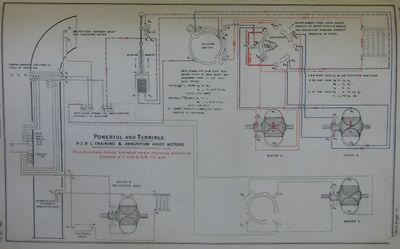Powerful Class Cruiser (1895)
The two protected cruisers of the Powerful Class were completed in 1897 and 1898.
| Name | Builder | Laid Down | Launched | Commissioned | Fate |
|---|---|---|---|---|---|
| Powerful | Naval Construction and Armaments Company, Barrow-in-Furness | 1894 | 24 July, 1895 | 8 June, 1897 | training Ship Impregnable, November, 1919. Sold 31 August, 1929 |
| Terrible | J. & G. Thomson, Clydebank | 1894 | 27 May, 1895 | 24 March, 1898 | Sold July, 1932 |
Searchlights
In 1907, these ships, along with the later Drake, Cressy, Monmouth and Devonshire classes and battleships of the Majestic, Canopus, London, and Duncan classes, were to land their searchlights from their tops and obtain two additional 24-inch models from their dockyards for placement on the shelter or boat deck.[1]
Armament
Main Battery

The 9.2-in gun turrets were trained and their ammunition hoisted by electric motors.[3]
Secondary Battery
Torpedoes
The aft submerged torpedo tubes were angled 45 degrees abaft the beam.[4]
Fire Control
Rangefinders
Evershed Bearing Indicators
It is unlikely that this equipment was ever provided.[Inference]
Directors
These ships never received directors for main or secondary batteries.[5]
Gunnery Control
Local Control in Turrets
Transmitting Stations
Dreyer Table
These ships never received Dreyer tables.[6]
Fire Control Instruments
By 1909, both ships were equipped with Siemens Mark I Fire Control Instruments for range, orders and deflection.[7]
The Handbook for Fire Control Instruments, 1909 lists the Mark I equipment for as:[8]
- Range: 6 transmitters, 34 receivers
- Orders: 6 transmitters, 24 receivers in Powerful and 20 in Terrible
- Rate: 4 transmitters, 12 receivers
- Deflection: 6 transmitters, 34 receivers
Additionally, the entire class had the following Siemens equipment:[9]
- Group Switches: 3
- Turret fire gongs: 2 with 1 keys
- Fire Gongs: 20 in Powerful, 16 in Terrible, both with 4 keys
- Captain's Cease Fire Bells: 20 with 1 key
These ships lacked Target Visible and Gun Ready signals.[10]
Torpedo Control
See Also
Footnotes
- ↑ Annual Report of the Torpedo School, 1907, p. 35. The location for each ship type was placement stipulated in C.N.2 11884/13066, 13.12.1906
- ↑ Annual Report of the Torpedo School, 1896 Plate 15.
- ↑ Annual Report of the Torpedo School, 1896, pp. 55-56, Plate 15.
- ↑ Annual Report of the Torpedo School, 1896, pp. 39-40.
- ↑ Director Firing Handbook, 1917, pp. 142-3.
- ↑ Handbook of Capt. F.C. Dreyer's Fire Control Tables, p. 3.
- ↑ Handbook for Fire Control Instruments, 1909, p. 56.
- ↑ Handbook for Fire Control Instruments, 1909, p. 59.
- ↑ Handbook for Fire Control Instruments, 1909, p. 59.
- ↑ Handbook for Fire Control Instruments, 1914, p. 11.
Bibliography
- H.M.S. Vernon. Annual Report of the Torpedo School, 1902. Copy 268 at The National Archives. ADM 189/22.
- Admiralty, Gunnery Branch (1910). Handbook for Fire Control Instruments, 1909. Copy No. 173 is Ja 345a at Admiralty Library, Portsmouth, United Kingdom.
- Admiralty, Gunnery Branch (1914). Handbook for Fire Control Instruments, 1914. G. 01627/14. C.B. 1030. Copy 1235 at The National Archives. ADM 186/191.
- Template:DirectorFiringH1917
- Template:DreyerTableH1918